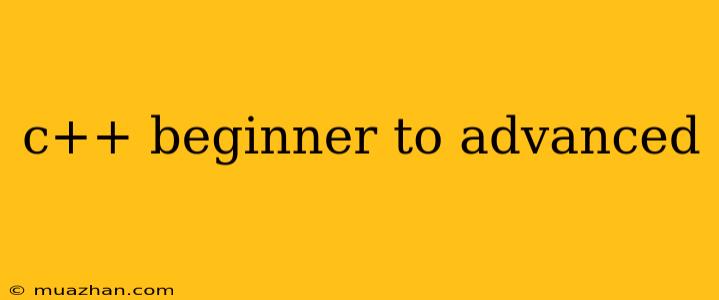C++ for Beginners: From Zero to Hero
C++ is a powerful and versatile programming language that has been used to create a wide range of applications, from operating systems to video games. It's a great language for beginners to learn because it teaches you about core programming concepts, like memory management and pointers, which can be applied to other languages.
This guide will take you from a complete beginner to an advanced C++ programmer. We'll cover the fundamental concepts, essential libraries, and advanced techniques that will help you master this powerful language.
1. Setting up your Development Environment
Before you can start writing C++ code, you'll need to set up a development environment. This includes:
- A C++ compiler: This is a program that translates your C++ code into machine-readable instructions. Popular options include GCC (GNU Compiler Collection), Clang, and Visual Studio.
- An IDE (Integrated Development Environment): This is a program that provides a user-friendly interface for writing, compiling, and debugging your code. Popular IDEs include Visual Studio, Code::Blocks, and CLion.
2. Basic Syntax and Data Types
The foundation of any programming language is its syntax. Let's dive into the basics of C++ syntax and data types:
- Hello World: The classic "Hello World" program is the perfect starting point:
#include
int main() {
std::cout << "Hello World!" << std::endl;
return 0;
}
- Variables: Variables are used to store data in a program. In C++, you need to declare the data type of the variable:
int age = 25;
float height = 1.75;
char initial = 'A';
-
Operators: C++ supports various operators for arithmetic, comparison, logical, and bitwise operations. Examples include:
- Arithmetic Operators: +, -, *, /, %
- Comparison Operators: ==, !=, >, <, >=, <=
- Logical Operators: && (AND), || (OR), ! (NOT)
-
Control Flow Statements: These statements allow you to control the flow of execution in your program.
- if/else statements: Execute different blocks of code based on a condition.
- for loop: Execute a block of code multiple times.
- while loop: Execute a block of code as long as a condition is true.
3. Essential Libraries and Concepts
As you progress, you'll find that C++ comes with a rich set of libraries that provide powerful functionalities.
- Standard Input/Output (iostream): This library provides functions for reading input from the user and displaying output on the console.
- String Manipulation (string): This library allows you to work with strings, including operations like concatenation, comparison, and searching.
- Vectors (vector): Vectors are dynamic arrays that can grow and shrink as needed. This is a fundamental data structure used in various C++ applications.
- Pointers: Pointers are variables that store memory addresses. Understanding pointers is crucial for managing memory efficiently and working with complex data structures.
- Classes and Objects: These are the building blocks of object-oriented programming. Classes define the blueprint for objects, while objects are instances of classes.
4. Advanced Topics
Once you've mastered the fundamentals, you can move on to more advanced topics:
- Object-Oriented Programming (OOP): OOP is a powerful programming paradigm that focuses on designing reusable and modular code.
- Templates: Templates allow you to write generic functions and classes that can be used with different data types.
- Exception Handling: Exception handling is a mechanism for dealing with errors or unexpected events that occur during program execution.
- Memory Management: C++ gives you control over memory allocation and deallocation. Understanding memory management is essential for writing efficient and robust applications.
- Standard Template Library (STL): The STL is a collection of data structures and algorithms that can be used to solve various programming problems efficiently.
5. Practice and Resources
The key to mastering any programming language is consistent practice. Here are some resources to help you on your journey:
- Online Courses: Platforms like Udemy, Coursera, and edX offer a wide variety of C++ courses for beginners and advanced learners.
- Books: "C++ Primer Plus" by Stephen Prata and "Accelerated C++" by Andrew Koenig and Barbara E. Moo are excellent resources for learning C++.
- Online Communities: Join forums and communities dedicated to C++ to ask questions, share your code, and learn from other programmers.
Conclusion
C++ is a powerful language that can be used to create a wide range of applications. By following this guide and dedicating yourself to learning, you can become a skilled C++ programmer and unlock a world of exciting possibilities. Remember, the journey is about constant learning and exploration. Enjoy the process!
